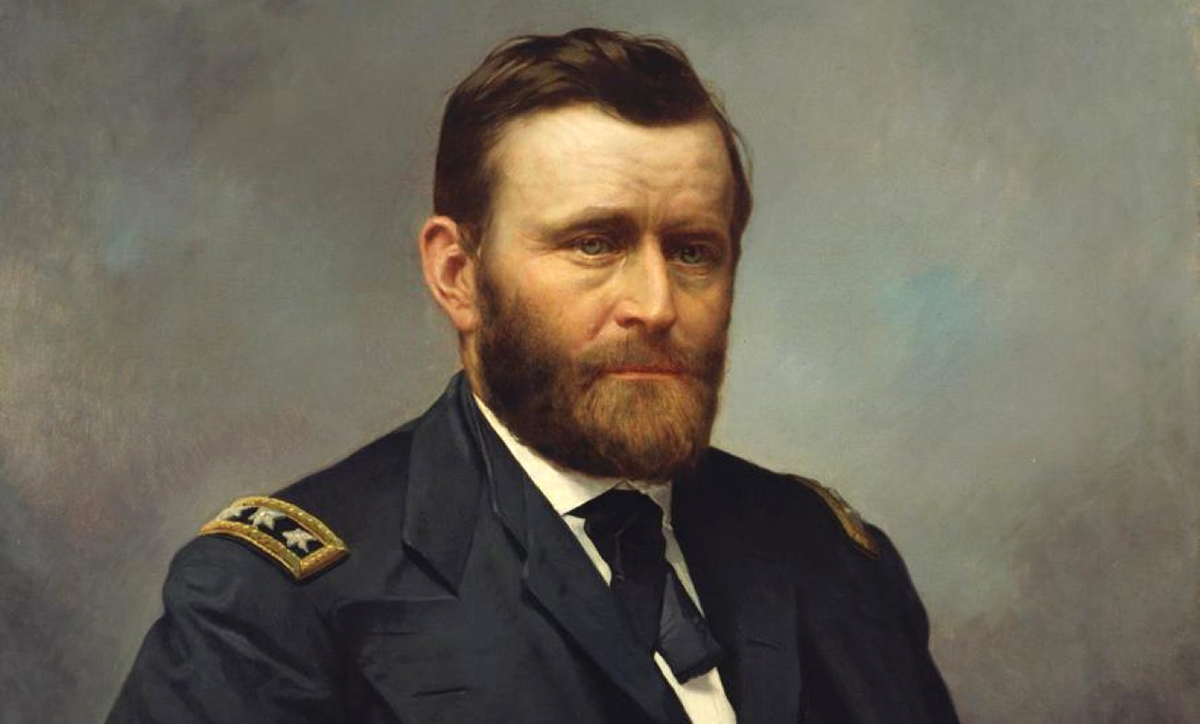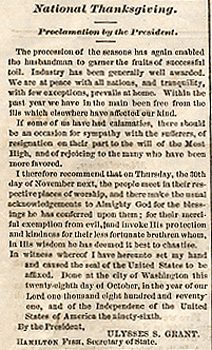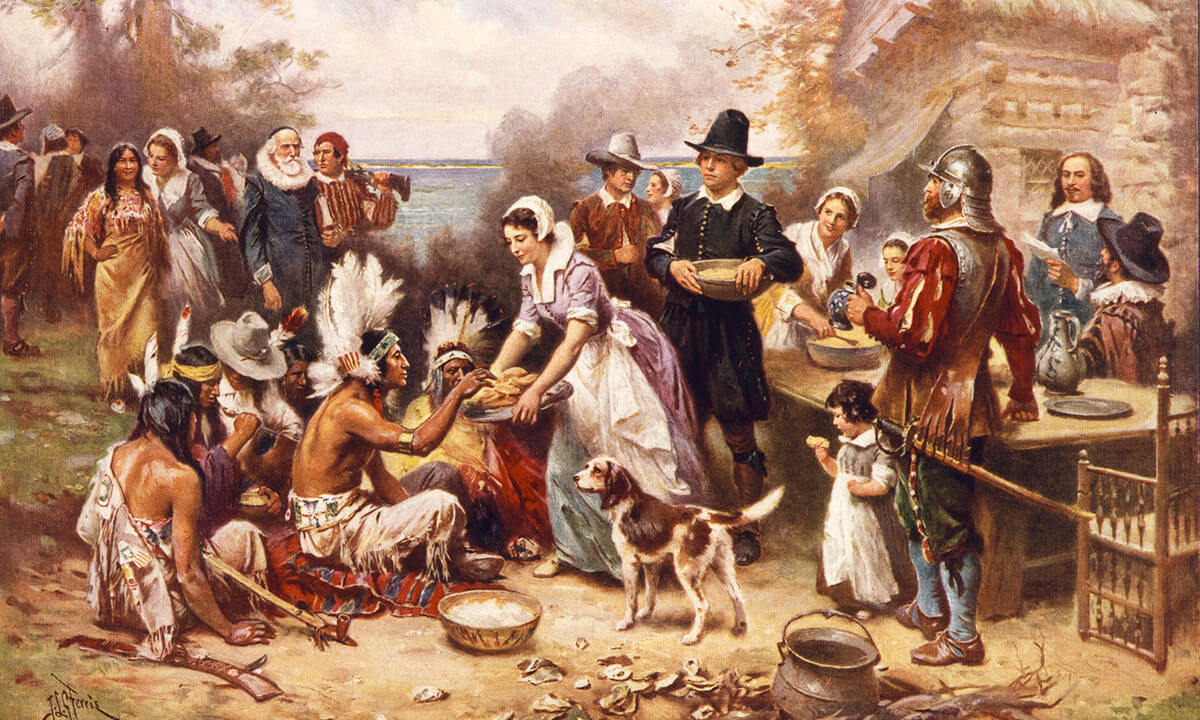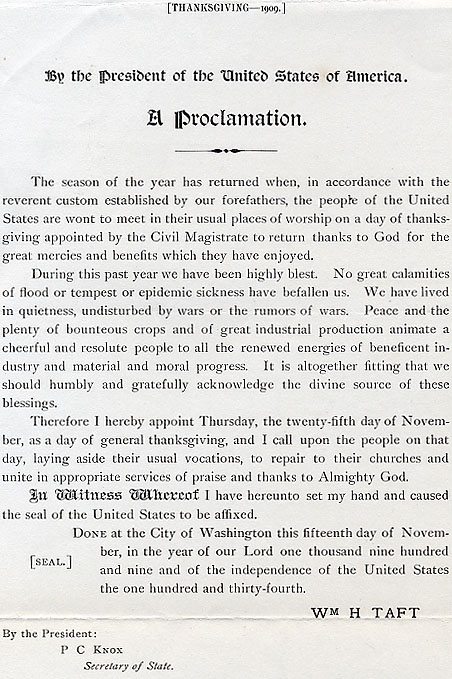Thomas Snell (1774-1862) graduated from Dartmouth in 1795. He briefly taught in Haverhill (1795). Snell was pastor of the 2nd Congregational Church in North Brookfield, MA (1798-1862). This election sermon was preached by Snell in Massachusetts on May 28, 1817.
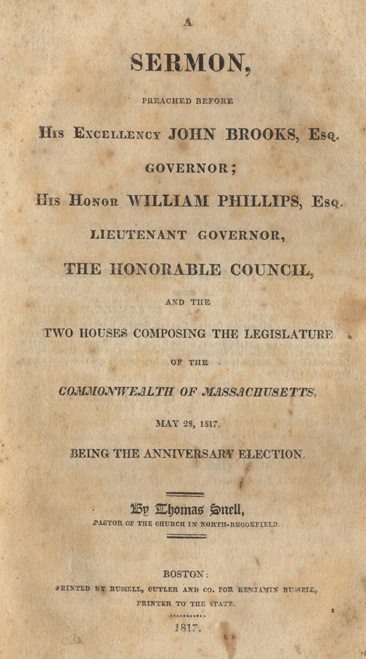
ASermon,
Preached Before
His Excellency JOHN BROOKS, Esq.
Governor;
His Honor WILLIAM PHILLIPS, Esq.
Lieutenant Governor,
The Honorable Council,
And The
Two Houses Composing The Legislature
Of The
Commonwealth Of Massachusetts,
May 28, 1817
Being The Anniversary Election.
By Thomas Snell
Pastor Of The Church In North-Brookfield
Commonwealth of Massachusetts.IN SENATE, May 28, 1817.
Ordered, that the HONORABLE OLIVER CROSBY, SAMUEL PORTER, and WILLIAM D. WILLIAMSON, Esquires, be a Committee to wait upon the REVEREND THOMAS SNELL, and in the name of the Senate, to thank him, for the Sermon, delivered this day, before his Excellency The Governor, His Honor the Lieutenant Governor, the Honorable Council, and the two branches of the Legislature; and to request a copy thereof, for the press.
Attest,
Samuel F. McCleary, Clerk.
ELECTION SERMON.ISAIAH, IV. 5.
For upon all the Glory shall be a Defense.
ISRAEL, though a favored nation, was subject to many reverses of fortune. Their prosperity, depending upon the pleasure of God, ebbed and flowed much according to their national character, which received a completion from their kings and priests. When a deceived heart had turned them aside from the safe and pleasant paths of wisdom, they found by sad experience, that it was an evil and bitter thing to forsake the God of their fathers. Withdrawing the protecting wing of his Providence and removing the hedge he had built around them and all they had, God left them weak and defenseless as other nations, and delivered them into the hand of their enemies, whose tender mercies were cruelty. Of such unwelcome events were they seasonably apprized to make their escape by repentance. While seeing the storm, which had long been gathering, actually bursting upon the nation; or viewing its awful desolations around them, their hearts were often cheered with a gracious message from Heaven, inspiring the hope that a brighter day would arise, even a morning without clouds. An instance of the kind is to be seen in the Prophet Isaiah’s address to his nation: “Thy men shall fall by the sword, and thy mighty in the war. Jerusalem is ruined and Judah is fallen; because their tongue and their doings are against the Lord, to provoke the eyes of his glory.” [Isaiah 3:25, Isaiah 3:8] But a happy day is to succeed this scene of national distress and desolation. “The branch of the Lord shall be beautiful and glorious and the fruit of the earth shall be excellent and comely for them that are escaped of Israel. He that is left in Zion, and he that remaineth in Jerusalem shall be called holy, even every one that is written among the living in Jerusalem: when the Lord shall have washed away the filth of the daughters of Zion, and shall have purged the blood of Jerusalem from the midst thereof, by the spirit of judgment, and by the spirit of burning. – And the Lord will create upon every dwelling place of Mount Zion, and upon her assemblies, a cloud and smoke by day, and he shining of a flaming fire by night; FOR UPON ALL THE GLORY SHALL BE A DEFENSE.” [Isaiah 4]
The truth suggested by these words for our consideration is this: The glory of a nation ensures their safety.
We may inquire in what the glory of a nation consists, and how this glory ensures their safety.
FIRST. In what does the glory of a nation essentially consist? As many are the streams which serve to swell the majestic river in its way to the ocean, so, many are the circumstances that may sub serve the glory of a state in which, however, it does not principally consist. That which forms the essential glory of one rational being, would be the glory of every other. The essential glory of God is his holiness. With his infinite majesty, God would have no glory, if he were not holy. “God is love.” [1 John 4:8] All his moral attributes are but different branches of this holy affection, denominated according to existing circumstances, and the different objects toward which it is exercised. The Lord is good, and his tender mercies are over all his works. When he would show Moses his glory, he made all his goodness pass before him. The blessed throng that surrounded the throne of Jehovah, are ever crying in transports of joy and praise, “Holy, holy, holy, Lord God Almighty,” [Revelation 4:8] as though his holiness formed his chief glory and laid the foundation of all their ascriptions of praise. To ascribe perfect moral purity to the living God with corresponding feelings and practice, is to do him the highest honor. Because the sovereign of the universe is glorious in holiness. HE is fearful in praises, and worthy the undivided affection and unlimited confidence of angels and men. Contemplate God as no longer dwelling in that light not to be approached unto and full of glory; and you strip him of every perfection that challenges the first love of his creatures. Having inculcated indiscriminate love to men, and enforced it by the divine example in the dispensations of a kind Providence, our Savior exhorted his followers, “Be ye perfect as your Father which is in Heaven is perfect.” [Matthew 5:48] Inculcating the same duty, God said to Israel, “Be ye holy, for I the Lord your God am holy.” [Leviticus 19:2] By holy love, men become the children of their Father who is I Heaven.
If the glory of the ever living God, consist in the moral purity of his nature, which is displayed in his works, then holiness forms the highest glory of man. What can be so honorable for a rational creature as to bear the moral likeness of his Creator, in which the resplendent glories of his character are alone to be found! Does holiness form the excellence of God? And must it not also form the excellence of man? Can that be no glory in the creature, which renders God infinitely amiable, demands the adoring love of his rational offspring, and secures the affectionate homage of all the good? The nearer man approximates to God in his moral feelings, and the more perfectly he bears his image of love, the greater his excellence and the brighter do his glories shine.
Man was made after the image of God that created him, in righteousness and true holiness. In this consisted the excellence of his character. This crown of righteousness constantly emitted beams of glory. But when he offended by sin, all this glory departed, and shame covered the fallen, debased creature. The revolted angles, while remaining in their primitive state of moral purity, united to God by holy love and satisfied with the place assigned them by divine wisdom, possessed a true glory of character. But when they rebelled against the Lord their King, all their glory was lost, in which they had shone with so much splendor as morning stars and as the sons of God.
The adorable Messiah is ‘the brightness of the Father’s glory and the express image of his person.’ [Hebrews 1:3] His whole life was but on bright display of a benevolent and holy heart. To the pollutions of the world he was ever a stranger, and the unhallowed passions which war in the human breast, and, like conflicting winds upon the great deep, cast up mire and dirt, found no place in his bosom. Clad in the robes of spotless innocence and love, how resplendent were the glories that beamed through the veil of his flesh! Christ is both our pattern and example to conduct us to true glory.
IF the spotless purity and love of Jesus – if the perfect holiness of the eternal God, form the highest glory of his nature, nothing can give so much excellence to man, as that moral goodness which assimilates him to his God and Savior. What is the glory of man individually considered, must be the glory of men in their national character. If man has no true glory without Christian virtue, how can a nation have? The mass partakes of the nature of its component parts. If these be precious, the body they compose will possess a proportionable excellence and value. If one gem glitter in a crown, how glorious must be the crown filled with gems? If Christian virtue give worth to man as an individual, how great is the sum of glory in a nation of righteous men! This is the glory to which the prophet alludes in the text. “He that is left in Zion, and he that remaineth in Jerusalem, shall be called holy, even every one that is written among the living in Jerusalem: When the Lord shall have washed away the filth of the daughters of Zion, and shall have purged the blood of Jerusalem from the midst thereof, by the spirit of judgment and by the spirit of burning.” [Isaiah 4:3-4]
Sin is a reproach to any people. The moral pollution of Israel was a stigma upon their national character; and their unprovoked abuse of God’s messengers and groundless disaffection to his truth were to their lasting disgrace. But here is a period foretold in which they are convinced of their sin, with godly sorrow look upon the Lord of glory whom they have pierced, their moral pollution is purged away by the Spirit of God, their dross consumed as by fire, they are a holy nation, and the Lord remembers their sin and iniquity no more. All the people becoming righteous, the nation is glorious in the eyes of the Lord, and God himself is their glory. When he led them out of the house of their bondage, the token of his presence was with them in the pillar of cloud by day and in the pillar of fire by night. So when they should again be purged from their sin and turn to God, from whom they had deeply revolted, the tokens of his gracious presence would be equally conspicuous, as if he should again appear in the pillar of cloud and of fire. Upon this pillar, the symbol of God’s presence, is it written as in capital of gold, ye are my people, and I am you God. A righteous nation is to him a peculiar people. They have not only the glory of national righteousness; but the honor of Jehovah’s presence. The throne of God and the Lamb is among them; as his servants, they serve him; they see his face and behold his glory, while his name is inscribed on their foreheads. In the midst of a holy nation God sheds forth the mild glories of his love, and renders them a praise and an excellency in the earth.
A righteous nation has the glory of just rulers. If the government be hereditary, God in His all controlling providence, will prepare good men for the throne, in mercy to a willing people. But if it be elective, where power immediately emanates from the will of the people, a righteous nation will delight to honor righteous men, while they are securing their best interest and adding luster to their crown of glory. Under a republican government, the people are responsible for the character of their rulers; and with them the error begins, which often terminates in their misery.
But when all our children are taught of God, our sons grow up as plants of righteousness in their youth, and become as polished pillars in the state. Instead of the fathers are the children, who become princes in all the land. The reflected glory of good rulers and a good people is reciprocal. The God of Israel said,He that ruleth over men must be just, ruling in the fear of God. And he shall be as the light of the morning, when the sun ariseth, even a morning without clouds.[2 Samuel 23:3-4] With what majestic glory does the rising sun beam upon the earth in a cloudless morning! With no less glory does the wise and good man sway the scepter over a virtuous people. When civil rulers magnify their office by a display of righteousness, truth, and mercy, how much glory is reflected upon the state they govern. Their administration is as refreshing as the vernal showers, and as pleasant as the sun after the rain. A ruler of this description, raised to a place of eminence, is as a city set upon a hill, whose glory is seen from afar – he is to the nation, what the sun is to our system, when shining in his strength. While it was a glory to Israel to have the symbol of God’s presence in their camp, it was an honor to have Moses, the just, the meek, the prayerful, for their guide. It was a glory to that nation to be conducted into the land of promise, by one who was not ashamed to say to Israel and the world, As for me and my house, we will serve the Lord. [Joshua 24:15] How much glory accrued to the kingdom from having a man after God’s own heart to fill the throne, who fed them according to the integrity of his heart, and guided them by the skillfulness of his hands! Had ever Athens greater glory, than that derived from Aristides the just? And how much luster was reflected upon the American name, when Washington, the wise and good, presided over the destinies of our country! And would it be more than a just tribute of respect, while the feelings of a grateful community would accord with the sentiment, to say, that glory has been reflected upon this Commonwealth from that venerable patriot, of tried virtue and a long course of eminent services, who has lately withdrawn from public life to enjoy the sweets of retirement!
A righteous nation has the glory of a pious and faithful ministry, well instructed into the things of the kingdom. A course of degeneracy is natural to fallen men. They quicken their pace in the downward road, when corrupt and false teachers guide their faith and form their manners. “My people are destroyed for lack of knowledge. Because thou hast rejected knowledge, I will reject the, that thou shalt be no priest to me: – As they were increased, so they sinned against me: therefore will I change their glory into shame. – And there shall be like people like priest.” [Hosea 4:6-7,9] Would you know the state of the people, you must look to the state of the temple: – From the sons of a righteous people, God will raise up men to minister at the altar, who will be burning and shining lights in the church. Trembling for the ark of God, they will not, like Hophni and Phinehas [sons of Eli], convey it to the camp and expose it to the uncircumcised Philistines; but labor to protect this glory of their Israel. While Moses was in the cabinet dispensing righteousness to his people, Aaron was a glory to his nation by ministered in the temple. When the ark of God was taken, it was said that the glory had departed from Israel. – But while the ark was still amongst them, their glory was awfully tarnished by the profaneness of the priesthood. Equal to the disgrace of an unholy ministry is the glory of pious an faithful teachers. Contemplate the dishonor upon Israel, when Jereboam took the lowest of the people, the ignorant and immoral, and made them the ministers of the sanctuary. Their character well corresponded with the stupid nature of the gods they worshipped. But the holy God of Israel, the Eternal Spirit, must have a holy ministry before the altar, to present spiritual sacrifices. And the people who have the Lord for their God – who are washed from their moral defilement by the spirit of judgment – who put a difference between the holy and profane, will be satisfied with no other ministry to present their spiritual offerings. The sin and scandal of an unholy priesthood will be attached to the state; while the glory of an Elijah, and of an Elisha upon whom his mantle fell, is reflected upon the people to whom they statedly minister. The adorable Savior Himself is an high priest, a minister of the sanctuary, and of the true tabernacle which the Lord pitched, and not man. Being holy, harmless, undefiled, and separate from sinners, he is an everlasting glory to the church which he has redeemed by his blood, instructed by his truth, and guided by his example. All his ambassadors who have imbibed his spirit and embraced his truth – who tread in his steps and faithfully deliver his message, are a crown of glory to the people whom they serve in the Lord.
A righteous nation has the glory of active usefulness and of being a blessing to the world. The views and efforts of real goodness are not circumscribed within the narrow sphere of self-interest or personal connections. Christian love is not an inert, but a living and active principle, which finds a pleasure in communicating happiness and is never satisfied while any good remains to be done. Nor are her views of usefulness bounded by the narrow limits of one generation, or even of time; but embrace an endless hereafter – not confined to the alleviation of man’s outward miseries, but extended to his emancipation from sin and death, that he may reign in life by one, Jesus Christ. Benevolence in good men is of the same diffusive nature with the love of God in extending his tender mercies over all his works; and the same with that of the glorious Emmanuel in dying for the redemption of the guilty.
A righteous people then, animated with holy love, while they regard the happiness of those that are near, will not be forgetful of those that are afar off they will be diving plans for doing good both at home and abroad. The state of their own country and the necessities of their own citizens will demand and engage their first attention. They pity the unfortunate and relieve them, solace the afflicted who have no comforter in their sorrows, and deliver those who have no helper in their distress.
Vice and impiety being the principal source and immediate occasion of human woes, will be vigorously assailed by a virtuous people, in their individual and associated capacity, countenanced by legislative influence and authority. Under the impression that those who have grown old in vice are rarely reformed, the greatest exertions are made with the young, and with the greatest encouragement. Barriers are formed to secure their virtuous habits and the sacred institutions of the gospel from the insidious influence and unhallowed violence of the profane and dissolute. – Inspired with benevolent affections, a people combine their efforts to disseminate the word of life and give moral and religious instruction to the neglected portion of the rising generation training up for mischief and ruin in ignorance of God and their duty. These efforts are extended to the suppression of profaneness and impiety which are followed with a train of evils; and intemperance, that monster, which has been stalking through the earth scattering misery and death around him; together with those haunts of men of the baser sort, where vice is taught with alarming success. Good men unite their influence to render virtue honorable and predominant and to brand vice and impiety with lasting disgrace; while their individual and associated strength opposes the spread of their desolating floods.
While fired with patriotism, righteous men extend their sympathy beyond the limits of their country to the distressed and perishing objects abroad in the earth, and with corresponding efforts commiserate the suffering nations groping in darkness and enslaved by sin. Touched with the feeling of their miseries whose ears were never saluted with the calls of grace and whose minds were never illumed by the gospel of peace, they will cherish every institution that looks to the mitigation of human sorrows for its object and promises lasting good to the world. While the blessing of many ready to perish will come upon them, they will attach a glory to their national character that will never fade. Such a land is more glorious than the mountains of prey. The triumphs of love vastly transcend the triumphs of power: The first is attended with peace and salvation, the last with violence and misery. The glory of Alexander in his bloody career of ambition and conquest, the military achievements of Caesar in crushing his foes and conquering the world, and the brilliant feats of the modern tyrants of Europe are unworthy to be named with the glory of attempting to conquer the world by truth and love. How is the luster of these military characters absorbed in the superior glory of the Christian prince in the north of Europe, who has adopted the principles of our holy religion for the basis of his administration, and is lending his personal influence and wealth to extend the blessings of the gospel through his empire? Were the benevolent spirit of a Swartz and a Howard to inspire a whole nation, would any wretched portion of the human family be forgotten? Would any measure of zeal be thought enthusiasm, or any schemes for their relief, too expensive? Would not the millions now wasted in dissipation and extravagance, or expended in war, be cheerfully devoted to relieve the miserable and make a happy world! Would the light and blessings of the gospel be long confined to the smaller portion of the human family? Would such a nation relax their exertions until the clouds of ignorance and sin were dispelled and the sun of righteousness had arisen upon every land?
Having Shown what constitutes national glory, viz. a virtuous people, with just rulers, a pious ministry, and active benevolence; let us enquire.
SECONDLY, how this glory ensures a nation’s safety. By a nation’s safety, we are to understand its security against anarchy, oppression, and violence within; the designs of enemies without, and the distressing judgments of Heaven. This safety involves the permanent union, order, and tranquility of a State.
The enquiry before us is this, How does the glory of a nation, as now described, ensure their safety?
First, By its natural influence upon the state of society, and secondly, by securing the favor of God.
By its natural influence upon the state of society. The benevolence of God is impressively exhibited in connecting the duty of man with his happiness. The religion taught us in his word calls man from the ways of sorrow and ruin to those of peace and life. It demands no service unconnected with reward, no duty without a promise, no sacrifice without a greater gain. While righteousness leads to ineffable glory in another world, it carries its own reward with it in this, by its happy influence upon society.
(1) A righteous nation enjoys internal tranquility.
The prophet observes, when speaking of a time, in which the spirit should be poured from on high to turn away ungodliness from men, Then judgment shall dwell in the wilderness, and righteousness remain in the fruitful field. And the work of righteousness shall be peace; and the effect of righteousness quietness and assurance forever. And my people shall dwell in a peaceable habitation, and in sure dwellings, and in quiet resting places.[Isaiah 32:16-18] In the reign and triumphs of Emmanuel, The mountains shall bring peace to the people, and the little hills by righteousness. In his days shall the righteous flourish; [Psalms 72:3, 7] and abundance of peace so long as the moon endureth. Civil dissentions ripening into enmity and open violence, have a most threatening aspect upon the existence of a State, while they destroy the sweetest pleasures of social life, and fill the minds of the virtuous with fear and trembling, as they await the issue. Such unhappy dissentions usually result from men of corrupt minds, or from those nominal patriots who hold themselves in readiness to immolate everything sacred and precious, even their country itself, upon the polluted altar of their ambition. One active and insidious enemy in the bosom of a State, who has access to the feelings of his fellow citizens, and knows how to strengthen their prejudices and inflame their passions, can do more to sap the foundations of the government, disturb the tranquility and overturn the liberties of a nations, than a host of avowed enemies without. Aspiring men of talents and subtlety, but void of religious principle, are ever dangerous characters. But a virtuous nation – a nation made up of men whose hearts are warmed with charity that seeketh not her own – men who esteem others better than themselves; of retiring feelings, rather than aspiring views, will cherish no such dangerous foes in her bosom. Men of Christian benevolence, whose objects is usefulness, rather than gain, are unshaken friends of the Commonwealth. Nor will they attempt to cast able and just men of tried virtue and unsullied character into the back ground, to make room for themselves; nor to distract the State with dissentions, tarnish her glory, and endanger her liberties for the sake of personal advantage. A prevalent spirit of righteousness and love will never suffer the seeks of anarchy and revolt to sprout and mature under a wise and impartial administration. Christian virtue is not the soil in which unprincipled ambition will generate, and grow with dangerous luxuriance; nor will it be found congenial to the spirit of party. Where non are disposed to make the passions of the populace a stepping-stone to power, party spirit will die: the axe is laid at the root of the tree.
Mutual love produces mutual condescension and forbearance. If the fire of party begin its destructive work, it can make no serious progress, so long as this fountain is pouring in its water to extinguish it. Unhallowed affections subdued, reason and grace enthroned, man could not proceed in this work of national destruction, but would rather sacrifice individual interests and party feelings for the common safety. The following questions are from an inspire pen, Whence come wars and fightings among you? Come they not hence, even of you lusts that war in your members?[James 4:1] Subdue the unholy passions of malice, pride, envy and avarice, and a nation would exhibit no unhappy scenes of animosity, contention and violence; but its citizens dwell together in unity, as brethren.
Since a righteous nation has the happiness and glory of just rulers, there is no reasonable occasion of rebellion or complaint – no pretext for attempting a revolution to the hazard of their liberties. Wise and good men may unintentionally err; a good people will view such errors with lenity. When there are none to misrepresent and exaggerate through prejudice or envy, or to spread abroad an evil report to inflame the passions of the populace, or alarm their fears, good and able men will still enjoy the confidence of a grateful people – a confidence, neither misplaced nor unmerited, since the measures of their administration result from their united wisdom, rectitude and love.
(2) A virtuous nation will enjoy the blessings of good government. To many have rested their hopes of national happiness upon the distinctive form of government they have adopted, without a due regard to the character of their rulers. Every conceivable form has, in succession, been devised and established with the hope of avoiding the evils incident to all other anarchy and the want of energy on the one hand, and the abuse of power on the other. But where power is delegated in a degree sufficient to give energy to government, it is always liable to gross abuse. But good men at the head of state – men solemnly impressed with their trust and responsibility, will ensure the blessings of good government, even if the form be not so eligible. But a constitution the most wisely framed, dividing and balancing power with the greatest precaution, affords no security to our rights and liberties, when the vilest of men are exalted. But personal distinction and emolument are not the governing motive of those who rule in the fear of God. The happiness of the public is increased by the confidence that just men inspire, that the affairs of state will be well conducted. They are ministers of God for good to the people. Their first object is the general and permanent good of the Commonwealth. They are the rulers of the State, and not of a party. As an affectionate parent regards every branch of his numerous household, so in tenderness and love, they watch over the concerns of the whole community. Civil government under a wise administration, extends its protecting and fostering hand over the person, reputation, substance, and liberties of every peaceable citizen.
The sword of the Lord is committed to the hand of the civil magistrate to protect the innocent and punish the guilty: Nor does he wield it in vain. He is a terror to the wicked, and a praise to them that do well. He rules for God, as well as for man; suppressing iniquity, so baneful to national prosperity; and encouraging religion, peace, and truth. The path to justice is made as plain and easy as possible, that all may have their wrongs redressed, without consuming their life and sacrificing their fortune in a fruitless attempt. When the officers of a state are peace and her exacters righteousness, the virtuous are countenanced in their attempts to effect a reform, profaneness is checked, vice suppressed, and judgment runs down her streets as a stream and righteousness as an overflowing flood.
(3) A righteous nation enjoys a high degree of happiness through the influence of active benevolence. Much of our enjoyment is of a social nature, or results from a state of society, cemented by love and endeared by mutual kindness. Society without friendship, or any happy bond of union, and, especially, with feelings of disaffected and hostility expressed by acts of violence, is far more intolerable than the solitude of an hermitage. But when no man goeth beyond or defraudeth his brother, when the law of kindness is in his lips and governs his life, when all the members of the community are bound together by the cords of love, and vie with each other in promoting general and individual happiness, when all are regulated by the great law of love, ‘Do to others as ye would that other should do unto you,’ how manifold the blessings that flow in upon society, to improve its state and enhance its enjoyment! What miseries of the human family would not be mitigated? How many avenues of sin and woe would be closed! The hand of the extortioner would no more be felt, nor the cry of the oppressed reach our ears. Violence would no longer be heard in the land, nor wasting and destruction within her borders. The obstinacy of men would yield to their interest, and a sense of duty and a desire for usefulness control their headstrong passions, and excite them to becoming efforts for the common good.- Beneficence would flow in ten thousand streams for the comfort of the unfortunate, while every charitable institution directed to the best interests of man would find numerous and powerful patrons. When the holy affection exemplified by our Lord rules in the heart, the lion in human shape, loses his ferocity and love of carnage, becomes the helper of the helpless and a guardian of the common interests. When each on becomes the promoter of others joys, the tide of national happiness and prosperity swells and flows like a mighty stream. “Behold, how good and how pleasant it is for brethren to dwell together in unity! It is as the dew of Hermon, and as the dew that descended upon the mountains of Zion: For there the Lord commanded the blessing.”
(4) Christian virtue, the health of a state, is perpetuated in a righteous nation by means of a pious ministry. Ministers of the sanctuary inspired with the true spirit of their office, and drawing all their instruction from the sacred stores of revealed truth, teach for doctrine the will of God and not the commandments of men. This is the appointed means of making men good and happy – the sword which the Mighty Redeemer girds upon his thigh when riding forth to the victories his grace. A divine influence descends as the dew of Heaven to refresh the ground that receives the word. The grace of God sways the heart to obedience, and men being converted to the wisdom of the just, are a people prepared for the Lord. While the fathers are ripening for glory and congregating with the dead, the children are springing up as willows by the water courses, and become plants of renown.- The pure instructions and sacred precepts of the gospel, enforced by its commanding motives, and in prospect of an eternal state of rewards, curb the restive passions of men, while they yet remain unattempted with Christian love. A holy people and pious ministry surrounding the mercy-seat in humble supplications, have power with God and prevail. “Even before they call, God will answer: and while they are speaking he will hear.”
(5) A virtuous people will escape the dangers of needless contests. The misery and ruin of nations often result from their unwarrantable attacks upon others, and intermeddling with contentions in which they have no concern. Prompted by a thirst for conquest and renown, rather than by a sense of duty and regard to righteousness, they too often enlist in contests questionable in their nature and long doubtful in their issue, as well as destructive in their progress and fatal in their effects. Nations have long rued the day in which they publicly declared their purpose to unsheathe the sword. The desolating progress of war has reared around them lasting monuments of their folly, to warn succeeding generations of the troubled sea, in which they have foundered.
The treatment which all nations will receive from a righteous people, will rather conciliate their favor and secure their confidence, than excite their jealousy and arouse their passions. Virtuous men are the sons of peace – the master they service is the Prince of peace – the Gospel they embrace is a message of peace – the Heaven they expect is a world of peace – and as much as in them lieth, will they not live peaceably with all men? Their war is not with mankind, but with sin and misery; and in this war, Christ is the captain they follow. And is it not time that Christian nations adopt the mid principles of their holy religion and carry them into the administration of their government and their national intercourse – that by common consent they shut the temple of war and forever secure its gates with bars of iron?
A nation inspired with the peaceable spirit of the Gospel, while ready to defend their soil and liberties, will reluctantly stain their garments with blood. The equity, expedience, and necessity of war must be unquestionable before they will enter the field of death, and hurry thoughtless mortals of their last account. – The Lord of love, who came not to destroy men’s lives but to save them, has no where taught his disciples to thirst for blood, but to subdue those lusts whence come wars and fighting’s. And when a people has imbibed, his spirit, neither the prospect of conquest, no, nor all the glory of a splendid triumph, will induce them to unsheathe the sword. In respect to the controlling influence of the Gospel over the hearts of men and the reign of righteousness and love, it stands recorded in the oracle of truth, They shall not hurt nor destroy in all my holy mountain: for the earth shall be full of the knowledge of the Lord, as the waters cover the sea.
(6) It is further to be observed, that if a nation be compelled to draw the sword in self-defense, the Christina spirit will give them strength, by creating union. As to the success of war, nations have calculated upon their physical strength. But circumstances occasion a vast disparity between their physical and their real strength. The first is principally determined by numbers, the second by union. A nation of the greatest physical strength, agitated by party and torn by dissentions, may sink under its own weight, or become an easy prey to the first daring assailant; while a small state becomes formidable by union. This union is ensured by love and righteousness. These are a cement which binds together virtuous men and forms them into one solid mass in defense of their common rights. Pervading the whole community, it forbids ruinous dissentions and fatal treachery, while it renders abortive the influence of artful emissaries. A state, thus united and faithful to the vows of allegiance, abides the dreadful blast of war, like the deep-rooted mountain against which storms and tempests beat in vain. Enfeebled by luxury and rent by divisions, the Roman empire, with its vast extent, had no strength against the hardy tribes of the north: While the union of the small states of Greece enabled them to withstand the mighty kingdom of Persia. “A kingdom divided against itself cannot stand:” but by virtuous union, “a little one becomes a thousand, and a small one a strong nation.”
But still “the race is not the swift nor the battle to the strong.” If a people have not Israel’s God for their defense, they cannot dwell in safety. Which leads me to observe,
II. “Promotion cometh neither from the east, nor from the west, nor from the south: But God is the judge; he putteth down one and setteth up another.” The counsels of the wise he turns into foolishness and blasts the towering hopes they have built upon their mighty schemes of ambition. – He comes forth from his place arraying the elements for the defense of his people, against the mighty. – “He that stretcheth out the Heavens alone; that spreadeth abroad the earth by himself: – that turneth wise men backward and maketh their knowledge foolish; that confirmeth the word of his servant and performeth the counsel of his messengers,” can bless a people and they shall be blessed; “for there is no enchantment against Jacob.”
While the God of Heaven dispenses his blessings with a sovereign hand, they are pledged to a willing people by gracious promise. “Godliness is profitable unto all things, having promise of the life that now is, and of that which is to come.” A holy nation is God’s peculiar people, whom he places as a seal upon his heart, and keeps as the apple of the eye. Israel’s calamities are all traced up to their unrighteousness, while they were uniformly assured that it should be well with them and their children, if they would sanctify the Lord of Hosts and let him be their fear and their dread. “At what instant I shall speak concerning a nation – to pluck up, and pull down, and to destroy it: If that nation turn from his evil, I will repent of the evil that I thought to do unto them.” It is a general principle of the Divine government tot treat nations much according to their national character. A virtuous people may rely upon God’s safe and holy keeping. “As an eagle stirreth up her nest, fluttereth over her young, spreadeth abroad her wings, taketh them, beareth them on her wings;” so the Lord doth lead and protect the people serve him. He giveth peace in their borders, plenty in their streets, and health in their habitations. His work appears unto his servants and his glory unto their children, whilst his everlasting arms of mercy are around them. Happy is that people that is in such a case, yea, happy is that people whose God is the Lord.
In the light of this subject it appears, that many, both in public and private life, have formed incorrect ideas of national glory. Objects may have an external splendor which dazzles the eye and excites the admiration of the multitude, while they possess no real excellence. And in circumstances of minor importance has the glory of nations been thought to consist: indeed, some have even gloried in their shame. Vast extent of territory, whether by purchase or conquest – an immense population, whether by natural increase or an influx of foreigners escaping from justice – exhaustless stores of wealth, whether gained by honest industry or lawless plunder – mighty armies crimsoned with blood and crowned with victory, whether in self defense or in destroying the innocent – and triumphant navies scouring the ocean and scattering death and ruin around the earth, have been considered separately and unitedly, as forming the true glory of nations, while they have been the servants of corruption. Such was the glory of Babylon when Nebuchadnezzar was filling her with spoil and treading down the nations as the mire of the streets. Alexander thought it the glory of Greece that he should conquer the world, and Hannibal the glory of Carthage, that he should vanquish the armies and carry war to the gates of Rome. The Romans made it their glory to conquer the surrounding provinces and widely extend their dominion; and no greater glory did the modern usurper seek for France, than to crush and plunder the nations and give laws to the world. But things of this nature remain to be told at another day, before the impartial tribunal of Jesus, where a different, but just estimate will be formed of the deeds of men, and of what constitutes their true glory. The considerations before names are insufficient of themselves to render a nation either happy or glorious. At best, they are fading laurels, unproductive of peace and enjoyment. How lamentably have the great men of the earth, with all their wisdom, mistaken their own, and their country’s glory. May the Lord by whom kings reign and princes decree judgment, give wisdom to our wise men, and knowledge to our men of understanding, that they may discern and pursue what pertains to the true glory of the State and our common country.
This subject addresses itself to civil rulers. The great object of government is to render the community safe and happy. This object tis not to be secured without national glory, which essentially consists in that moral goodness which assimilated man to his God. It then becomes the imperious duty of those who rule over men, to adopt every wise and judicious measure for the promotion and predominant influence of righteousness and truth. This they may do both by their authority and example.
Corresponding with the general principles of the constitution, the charter of our rights, legislators are to establish laws promotive of the best interest of society – laws, to deter evil-doers from crimes against piety – laws, that will hedge up the path of the wicked and make the way of transgressors hard. Vie and profaneness are not only a reproach to men, but lead to disorder, violence, and misery as their natural fruits; while they awaken the displeasure of a holy God, and arm against themselves, their posterity, and their precious interests, the judgments of his Providence. While civil statutes should never aim to control man’s faith and conscience, they should stand as a sacred enclosure around every religious institution of divine appointment, and secure the friends of order, religion, and their country, in the quiet enjoyment of the precious gifts of Heaven.
Protecting the Christian Sabbath by civil statutes from open violation, is not to be considered an infringement on the rights of any man’s conscience; but only a wholesome restraint upon lawless men who neither fear God, nor regard the peace and safety of their country. Do we encroach upon any man’s rights by restraining him from crimes injurious to individuals or to the commonwealth? How then are the rights of men infringed when they are restrained form treading down an institution most precious to fathers, most conducive to civilization and Christian virtue, necessary to maintain a sense of God, of moral obligation, and personal responsibility, and on whose support and sacred observance, essentially depend the safety to glory of the state? Be entreated, ye guardians of our rights, to consider the sacredness of the Sabbath, its gracious design, its public utility, its solemn bearing upon the best interests of man for time and eternity, and leave no the hopes of the virtuous to be disappointed; nor their exertions for its support to be paralyzed by any defect of law.
But what are laws if unsupported? What better than a dead weight to sink the majesty of civil authority and bring it into contempt? When laws are suffered to sleep transgressors are awake; and collecting new courage and strength, become daringly bold. Having long since silenced the voice of conscience and put the enteral judgment out of sight, they now imagine their triumph complete, when the sword of justice no longer awakes against them. In times of degeneracy, laws can have no force, if magistrates have no conscience.
Ye ministers of justice, has not the public, and the generation ye to be born, a solemn claim to your fidelity? Is not the oath, the oath of God upon you? We look to our Legislators as the guardians of our rights, to you, as the life and guardians of our laws. Bear not the sword of the Lord in vain. But remembering that you judge for God and stand amenable at his bar, rise superior to the controlling influence of popular motives, exercise your authority with wisdom and moderation, and still with firmness. You love your country, you wish her safe and happy. Then labor to advance her glory by suppressing vice and supporting the sacred institutions of Christianity, those pillars on which this glory must rise. See the many thousands of our Israel, who have confided their important concerns to your hands, feel the awful responsibility of your station, and betray not your trust.
But what will laws avail if ruler be the first to break them? How can Christian virtue appear so honorable, if not practiced by those who move in the higher spheres of life? If our civil fathers themselves respect not the institutions of religion and the laws designed for their support, will not others take encouragement to treat them with sovereign contempt? The example of those who enjoy the honorable and confidence of the public, has a secret, but powerful influence in forming the characters o four young men who are looking forward for promotion? When they see virtue and piety in places of honor, vice and irreligion excluded, it will be a powerful inducement to maintain an unsullied reputation, and respect the sacred institutions of our holy religion. In the conspicuous stations you fill, your example cannot be hidden, and its influence will be commanding. Then let it shine with all the glory it can derive form Christian piety, inspiring our youth with an awe of God and winning them to the practice of every virtue.
And ye ministers of the sanctuary, set for the defense of the truth and for the light of the land, he not forgetful that you may detract from the honor of the state and expose it to the frowns of Heaven. Let not he light that is in you be darkness. A pious ministry is a glory to a people, but a faithless priesthood a disgrace. By the purity of your morals, the fervency of your piety, the humble sincerity of your prayers, your unshaken attachment to the truth, and your fidelity in delivering the message of God, add a luster to the glory of the State, while you are training up a people for the glories of Heaven.
We would congratulate his Excellency the Governor on his re-election to the first magistracy of the Commonwealth with such evident tokens of the increasing confidence of the pubic in his administration. It is fondly hoped that the will continue to give unequivocal evidence that his mind is solemnly impressed with the sentiments, that a state has neither safety nor glory without religion. May he long live both to enjoy, and, by his personal services, to perpetuate the independence and liberties which he labored to achieve.
His Honor the Lieutenant Governor, will accept a tribute of grateful respect for his past services to the Commonwealth in the honorable station to which, with pleasure, we once more see him called by the unsolicited suffrages of a free people. We would remember the example of munificence which he has set to others in public life, and in which we see a practical illustration of the sentiment, that active benevolence, while its ministers to individual enjoyment, contributes to national glory.
The Honorable Legislature, to whom we tender our respects, will never forget that he State can be neither happy nor glorious without virtue and piety – that these can live and flourish only by the aid Christian institutions. These, they will ever feel it the imperious duty to support and foster with sacred and paternal care, and faithfully defend against the unhallowed violence of the profane.
And now, ye men of state, whom the people have delighted to honor, and whom it is no less my pleasure than my duty to respect, allow the preacher to express this one fervent desire, that you may, individually and conjointly, both in your public and private stations, be a glory and defense of the state; and having been faithful in promoting the righteousness that exalteth a nation, with the blessing of a grateful people upon your memory in the favor of your God, may you shine in glory as the stars forever.
Thou land of our birth! Once the asylum of our Fathers from oppression, now the land of their sepulchers, and dear to us their children, washed from thy pollutions and purged from thy blood, may the Lord create upon all thy dwelling places and upon thy civil and sacred assemblies, a pillar of cloud by day and the shining of a flaming fire by night; and upon all this glory may there be an everlasting defense.
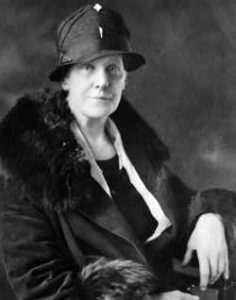 American celebrations of mothers were held prior to the official Mother’s Day holiday. For example, Anna Reeves Jarvis coordinated celebrations in Virginia before the Civil War and in West Virginia after the War.1 Other early versions of Mother’s Day were organized from the 1870s to the early 1900s by Julia Ward Howe, Mary Towles Sasseen, Frank Hering, and others.2
American celebrations of mothers were held prior to the official Mother’s Day holiday. For example, Anna Reeves Jarvis coordinated celebrations in Virginia before the Civil War and in West Virginia after the War.1 Other early versions of Mother’s Day were organized from the 1870s to the early 1900s by Julia Ward Howe, Mary Towles Sasseen, Frank Hering, and others.2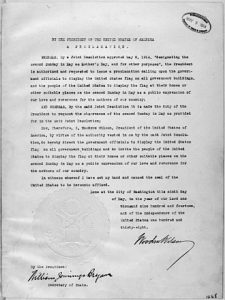 In 1910, West Virginia became the first state to hold an official statewide celebration.5
In 1910, West Virginia became the first state to hold an official statewide celebration.5
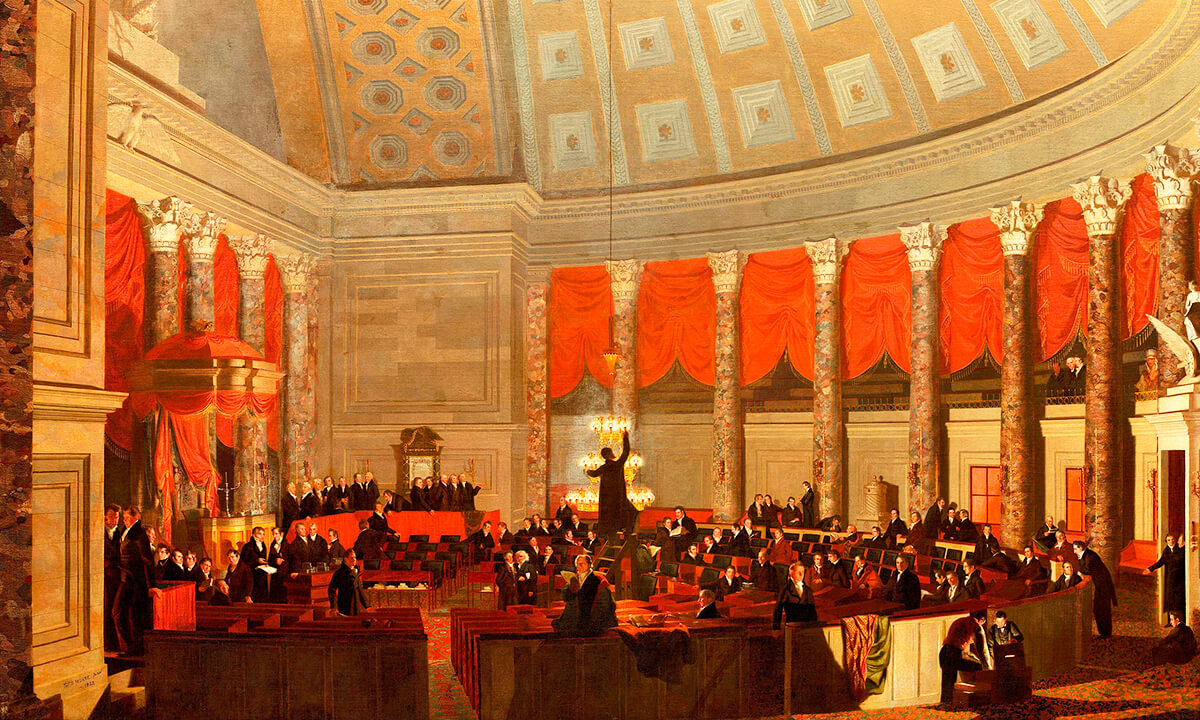
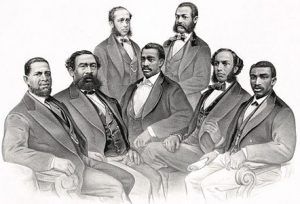 From the time before the American War for Independence, black Americans served as
From the time before the American War for Independence, black Americans served as 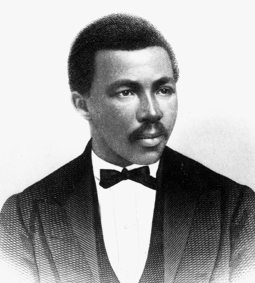 [I]t is a matter of regret to me that it is necessary at this day that I should rise in the presence of an American Congress to advocate a bill which simply asserts rights and equal privileges for all classes of American citizens. I regret, sir, that the dark hue of my skin may lend a color to the imputation that I am controlled by motives personal to myself in my advocacy of this great measure of natural justice. Sir, the motive that impels me is restricted by no such narrow boundary but is as broad as the Constitution.
[I]t is a matter of regret to me that it is necessary at this day that I should rise in the presence of an American Congress to advocate a bill which simply asserts rights and equal privileges for all classes of American citizens. I regret, sir, that the dark hue of my skin may lend a color to the imputation that I am controlled by motives personal to myself in my advocacy of this great measure of natural justice. Sir, the motive that impels me is restricted by no such narrow boundary but is as broad as the Constitution.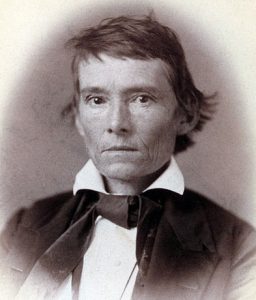 He [Stephens — pictured on the right] offers his government (which he has done his utmost to destroy) a very poor return for its magnanimous treatment, to come here to seek to continue, by the assertion of doctrines obnoxious to the true principles of our government, the burdens and oppressions which rest upon five millions of his countrymen [slaves] who never failed to lift their earnest prayers for the success of this government when the gentleman [Stephens] was asking to break up the Union of these States and to blot the American Republic from the galaxy of nations.
He [Stephens — pictured on the right] offers his government (which he has done his utmost to destroy) a very poor return for its magnanimous treatment, to come here to seek to continue, by the assertion of doctrines obnoxious to the true principles of our government, the burdens and oppressions which rest upon five millions of his countrymen [slaves] who never failed to lift their earnest prayers for the success of this government when the gentleman [Stephens] was asking to break up the Union of these States and to blot the American Republic from the galaxy of nations.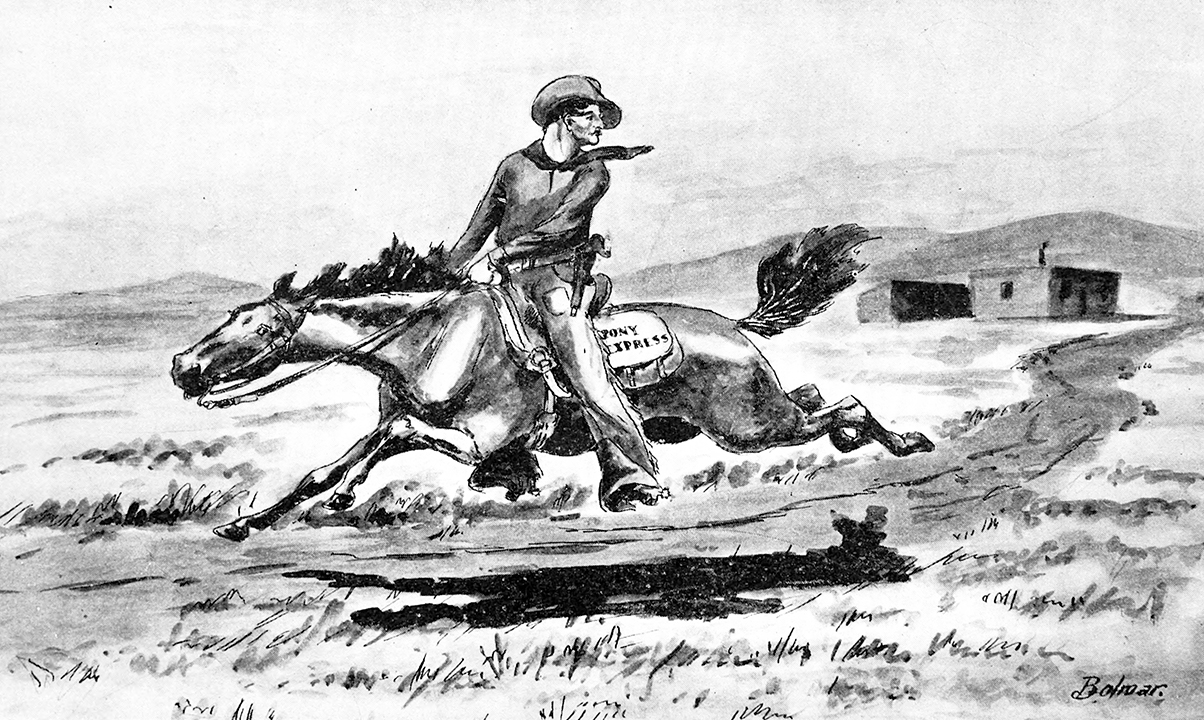

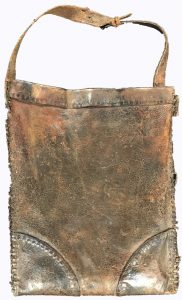
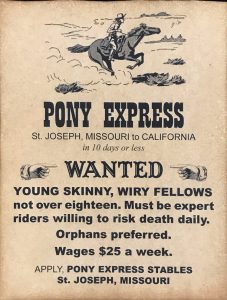
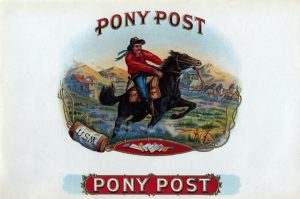


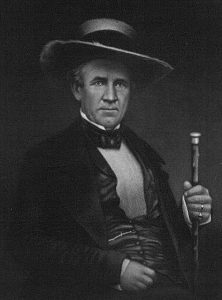
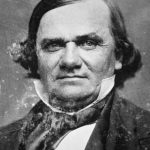
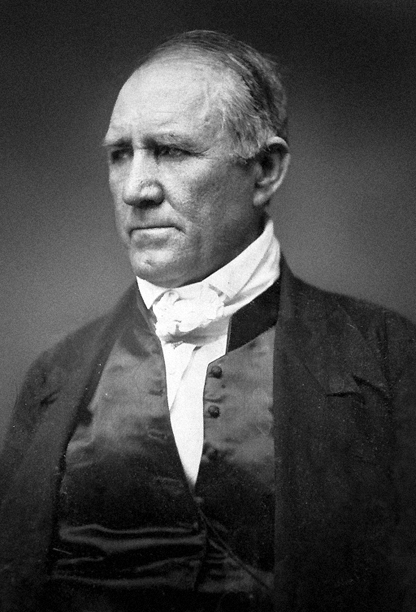 …I certainly can see no more impropriety in ministers of the Gospel, in their vocation, memorializing [petitioning] Congress than politicians or other individuals. . . . Because they are ministers of the Gospel, they are not disfranchised of political rights and privileges and . . . they have a right to spread their opinions on the records of the nation. . . . The great Redeemer of the World enjoined duties upon mankind; and there is [also] the moral constitution from which we have derived all the excellent principles of our political Constitution – the great principles upon which our government, morally, socially, and religiously is founded. Then, sir, I do not think there is anything very derogatory to our institutions in the ministers of the Gospel expressing their opinions. They have a right to do it. No man can be a minister without first being a man. He has political rights; he has also the rights of a missionary of the Savior, and he is not disfranchised by his vocation. . . . He has a right to interpose his voice as one of its citizens against the adoption of any measure which he believes will injure the nation. . . . [Ministers] have the right to think it is morally wrong, politically wrong, civilly wrong, and socially wrong. . . . and if they denounce a measure in advance, it is what they have a right to do.
…I certainly can see no more impropriety in ministers of the Gospel, in their vocation, memorializing [petitioning] Congress than politicians or other individuals. . . . Because they are ministers of the Gospel, they are not disfranchised of political rights and privileges and . . . they have a right to spread their opinions on the records of the nation. . . . The great Redeemer of the World enjoined duties upon mankind; and there is [also] the moral constitution from which we have derived all the excellent principles of our political Constitution – the great principles upon which our government, morally, socially, and religiously is founded. Then, sir, I do not think there is anything very derogatory to our institutions in the ministers of the Gospel expressing their opinions. They have a right to do it. No man can be a minister without first being a man. He has political rights; he has also the rights of a missionary of the Savior, and he is not disfranchised by his vocation. . . . He has a right to interpose his voice as one of its citizens against the adoption of any measure which he believes will injure the nation. . . . [Ministers] have the right to think it is morally wrong, politically wrong, civilly wrong, and socially wrong. . . . and if they denounce a measure in advance, it is what they have a right to do. 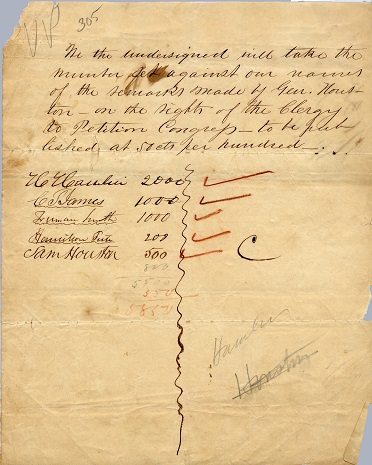
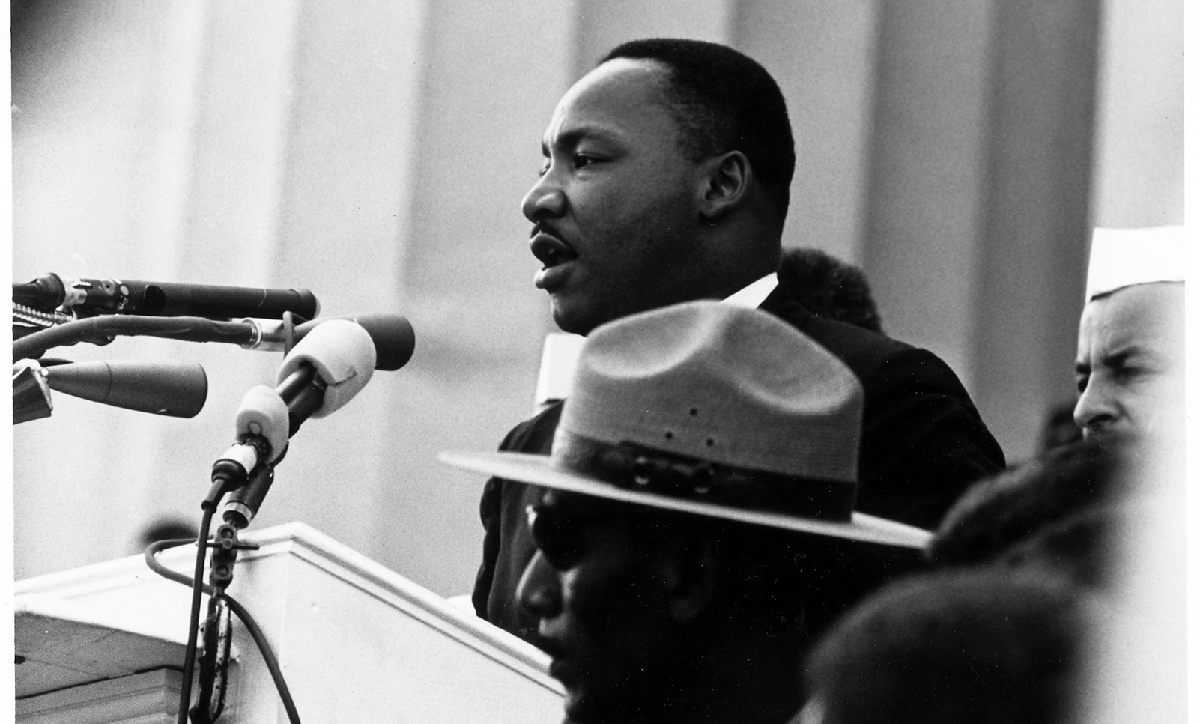
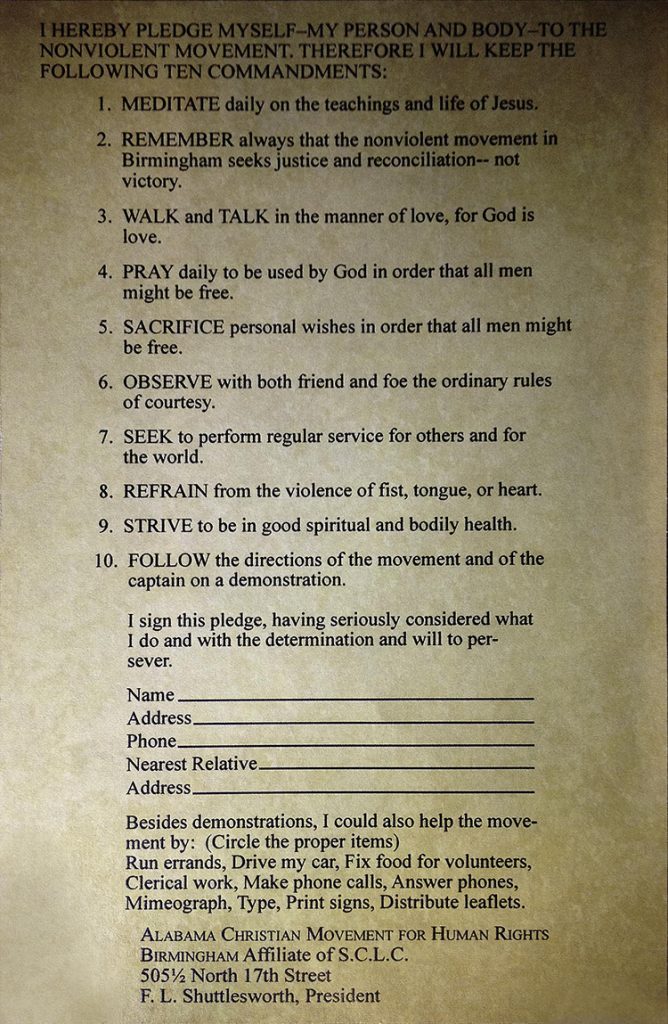
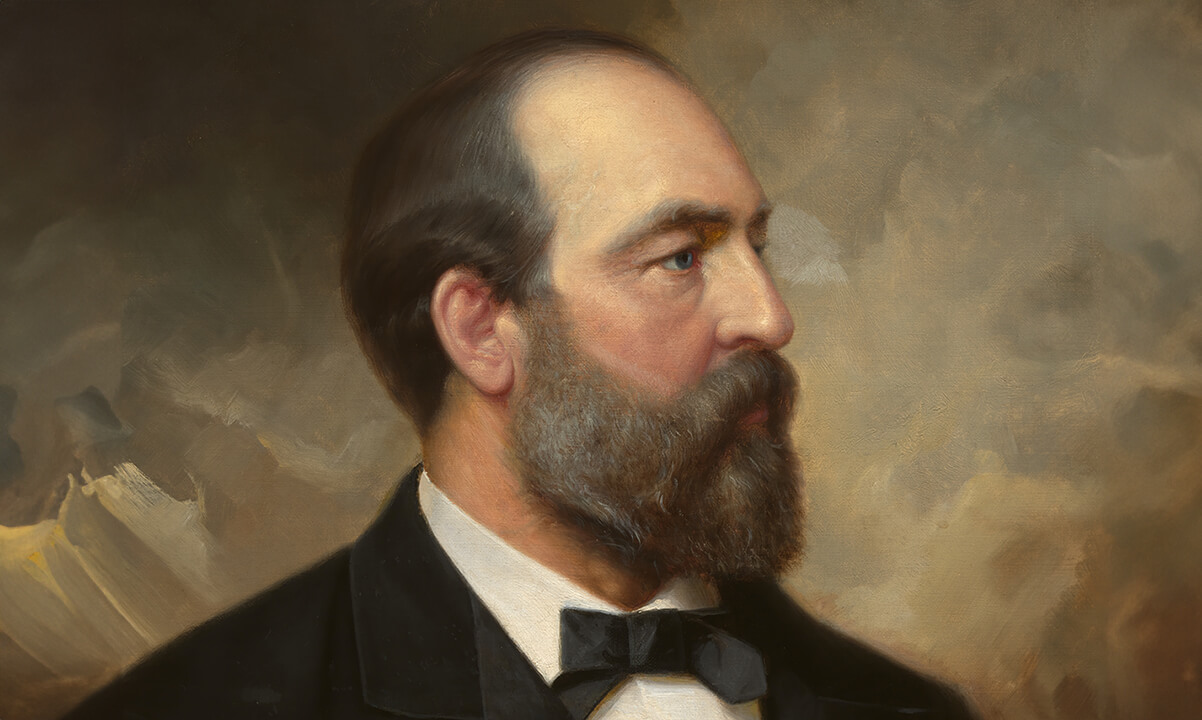
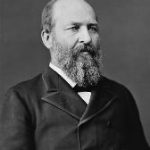
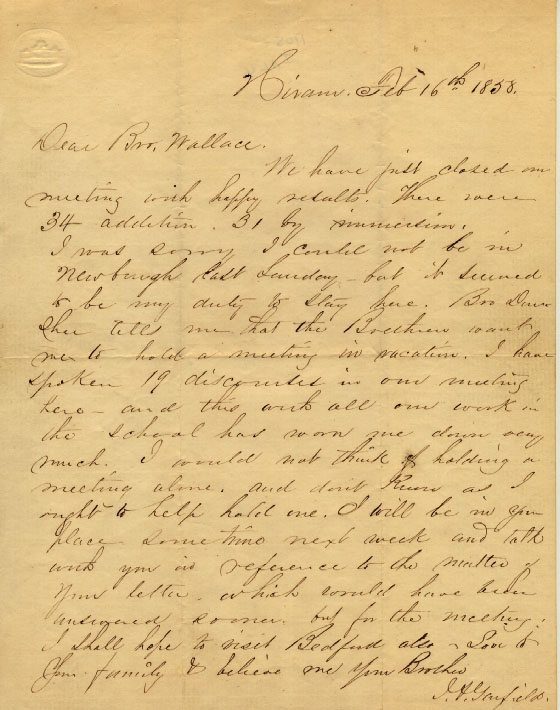
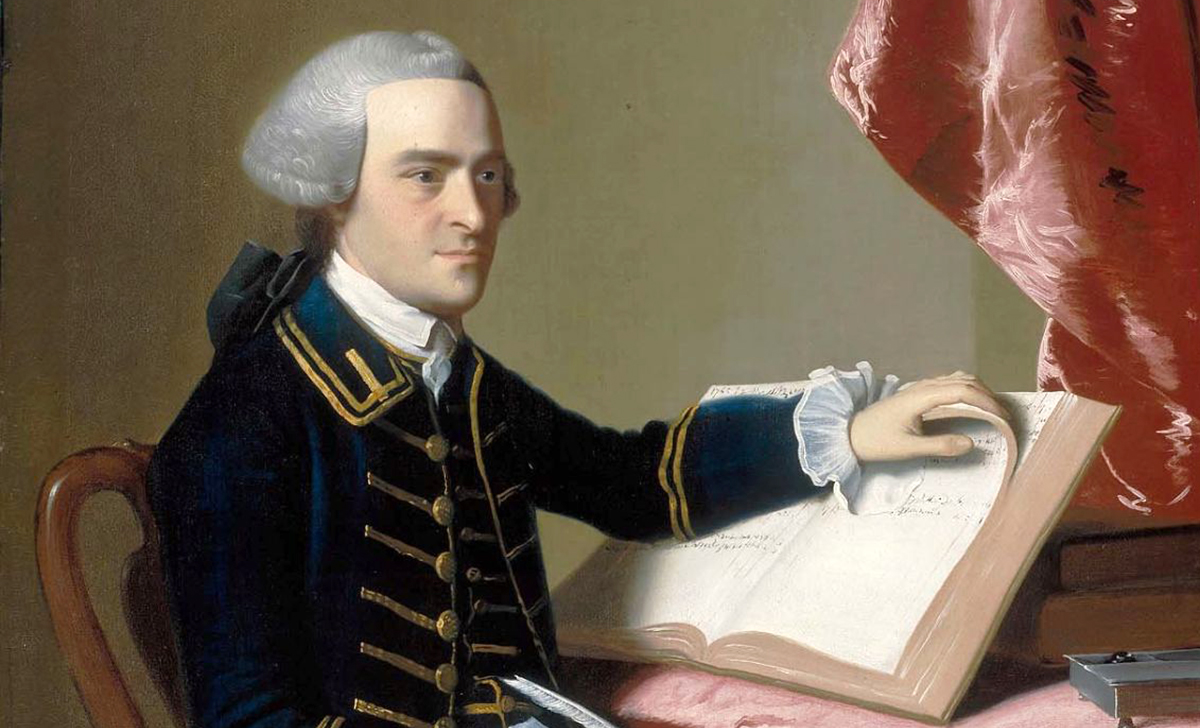
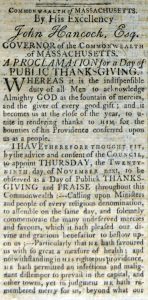 WHEREAS it is the indispensable duty of all Men to acknowledge Almighty GOD as the fountain of mercies, and the giver of every good gift; and it becomes us at the close of the year, to unite in rendering thanks to Him for the bounties of his Providence conferred upon us as a people.
WHEREAS it is the indispensable duty of all Men to acknowledge Almighty GOD as the fountain of mercies, and the giver of every good gift; and it becomes us at the close of the year, to unite in rendering thanks to Him for the bounties of his Providence conferred upon us as a people. And, together with our sincere and pious acknowledgments, I do earnestly recommend, the penitent confession of our sins; amendment of our hearts and lives, and humble supplication to GOD, for His further aid, protection and blessing:—That He would especially be pleased to endue the administrators of the federal constitution, and of this, and the other States in the Union, with sound wisdom and understanding; the fear of GOD, and love of their country, and a single aim to preserve and promote the liberty, prosperity and happiness of the people: And that He would grant to all, a spirit of truth, and discernment; a due regard to every wise administration, and to the importance of internal peace and Union:—To afford His further smiles on our agriculture, fisheries, commerce, and all the labor of our hands;—To guide and direct the University, and all schools and seminaries of learning, so that our children and youth, by a wholesome education, may be deeply impressed with the principles of true religion, and solid virtue.—That He would be pleased to afford His almighty aid to all people, and more especially the French Nation, who are virtuously struggling for their just and equal rights. And finally, that He would be pleased to overrule the commotions and confusions that are in the earth, to the speedy downfall of tyranny and oppression, so that the kingdom of our LORD and SAVIOR JESUS CHRIST may be established in Peace and Righteousness, among all the Nations of the Earth.
And, together with our sincere and pious acknowledgments, I do earnestly recommend, the penitent confession of our sins; amendment of our hearts and lives, and humble supplication to GOD, for His further aid, protection and blessing:—That He would especially be pleased to endue the administrators of the federal constitution, and of this, and the other States in the Union, with sound wisdom and understanding; the fear of GOD, and love of their country, and a single aim to preserve and promote the liberty, prosperity and happiness of the people: And that He would grant to all, a spirit of truth, and discernment; a due regard to every wise administration, and to the importance of internal peace and Union:—To afford His further smiles on our agriculture, fisheries, commerce, and all the labor of our hands;—To guide and direct the University, and all schools and seminaries of learning, so that our children and youth, by a wholesome education, may be deeply impressed with the principles of true religion, and solid virtue.—That He would be pleased to afford His almighty aid to all people, and more especially the French Nation, who are virtuously struggling for their just and equal rights. And finally, that He would be pleased to overrule the commotions and confusions that are in the earth, to the speedy downfall of tyranny and oppression, so that the kingdom of our LORD and SAVIOR JESUS CHRIST may be established in Peace and Righteousness, among all the Nations of the Earth.